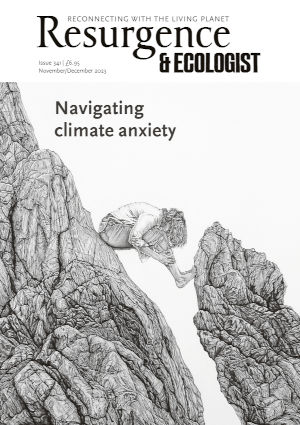The philosopher and humanitarian Albert Schweitzer once said that there are three ways of changing the world: the first is by example, the second is by example, and the third – you’ve guessed it – is by example. Schweitzer said that his life was his testimony, and the same can be said of my old friend Satish Kumar, whom I regard as one of our great sages and planetary elders. He lives a life of elegant simplicity, inspiring people around the world to work for the Earth, for peace and for a truly living education, which he himself pioneered in founding both The Small School in Hartland, and Schumacher College.
In this book, written with his customary clarity and passion, Satish distils and expresses his philosophy and outlook. I often say that we do not take the power of love seriously enough – both Gandhi and Bulgarian spiritual teacher Peter Deunov saw love as an ontological and transformative power. So it is very good to see Satish elaborating on the centrality of love in a series of nearly 30 chapters interspersed with poetic meditations. The headings convey some idea of the scope of the book: unity, diversity, soil, seeds, water, localism, peace, walking, food and garden, reason and science, learning and generosity. Readers are invited to reflect deeply and apply Satish’s practical insights in their own lives. Satish quotes Tolstoy as saying: “There is no greatness where there is no simplicity, goodness, and truth.” And Picasso: “The purpose of life is to give it away.”
Perhaps the fundamental shift we need to make is from love of power to the power of love, which Satish already articulates in his introduction when he writes: “Everything is held together by love… a lack of love leads to war, conflict, competition, exploitation, domination, and subjugation of people and of Nature.”
Instead of the trinity of Market, Money and Materialism, Satish proposes the trinity of Soil, Soul and Society as the principles of an Age of Ecology, an ecology of love. Satish is well aware of the systemic obstacles and institutions embedded in the status quo, but he insists that activists are optimists, stating that the message of Resurgence magazine, which he edited for over 40 years, is to love: “Love yourself, love people, love planet, love Nature… Act to uphold beauty and integrity. Activism is a journey and not a destination.”
Nature is an expression of unity in diversity, but the story of separation turns human diversity into human division, disconnection, polarisation, prejudice, othering, and ultimately even war, which further promotes this process. In a number of chapters, Satish relates the wisdom of his mother, for instance in relation to trees, food, healing and walking. The chapter on walking refers to the 8,000-mile peace walk he undertook in his twenties, as well as a 2,000-mile pilgrimage around his 50th birthday – I well remember the congenial evening we spent together in Winchester. In both cases he travelled without money, trusting in the inherent goodness and generosity of people.
Regenerative agriculture plays a central role as an expression of love, harmony and healing. Even mainstream sources are now realising that the soil is not inert, but a living ecosystem, as is the seed. Satish’s teacher Vinoba Bhave taught him lessons of water as flow and flexibility, and Satish relates a story of Gandhi and Nehru, where Gandhi is dismayed on realising that he is going to need some extra water because he had not used the jug mindfully when washing.
This book is full of gems of wisdom and instructive anecdotes in putting forward a love manifesto and proposing the revolution of love involving both inner and outer transformation, as well as overcoming what Satish calls the four obstacles to love: “criticising, complaining, controlling and comparing”. Readers will find a deep well of inspiration and genuine hope in Satish’s life and words. Radical Love is certain to become a classic and will surely still be read 100 years from now.
Radical Love: From Separation to Connection with the Earth, Each Other, and Ourselves by Satish Kumar. Parallax Press, 2023. ISBN: 9781952692352.








